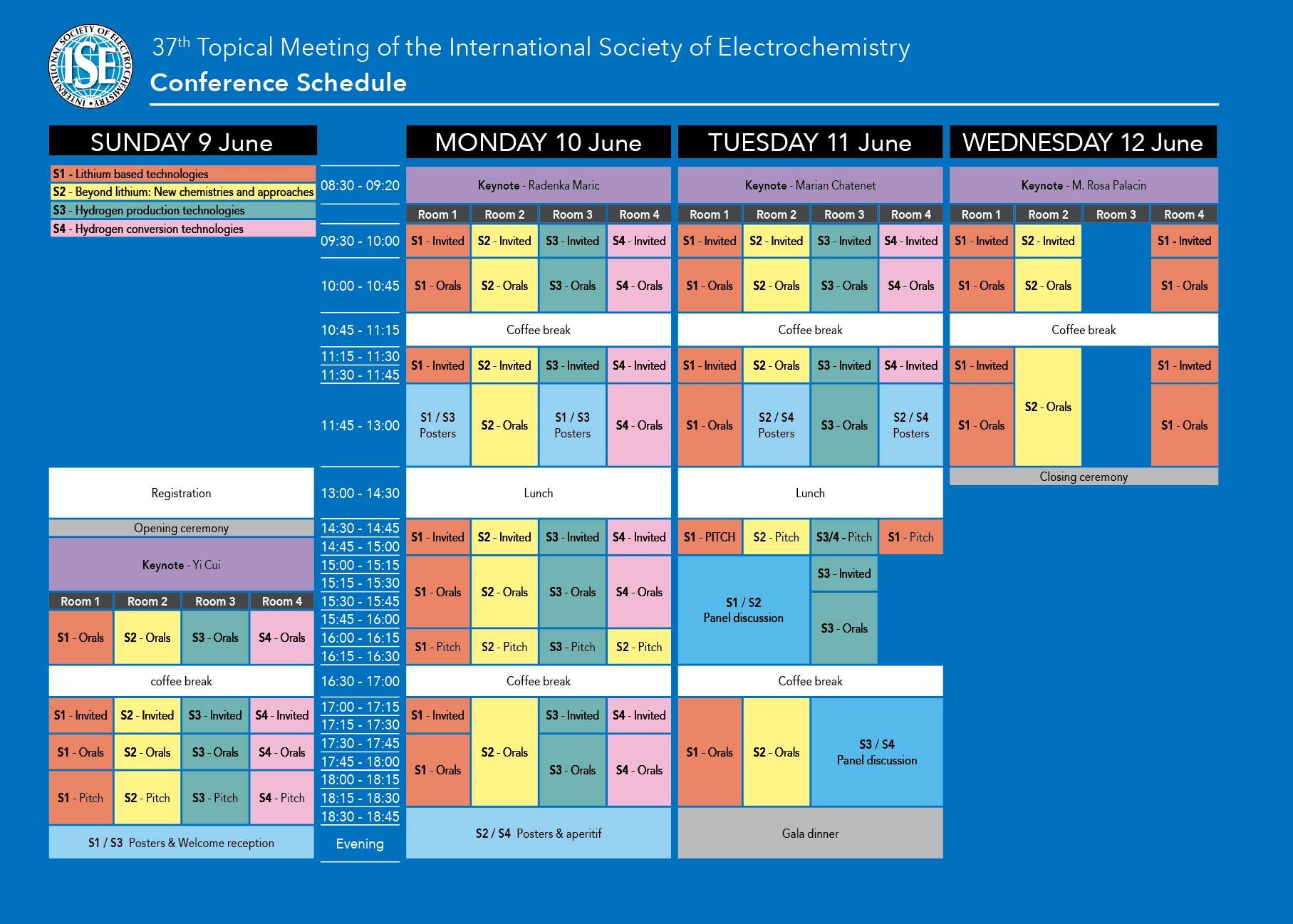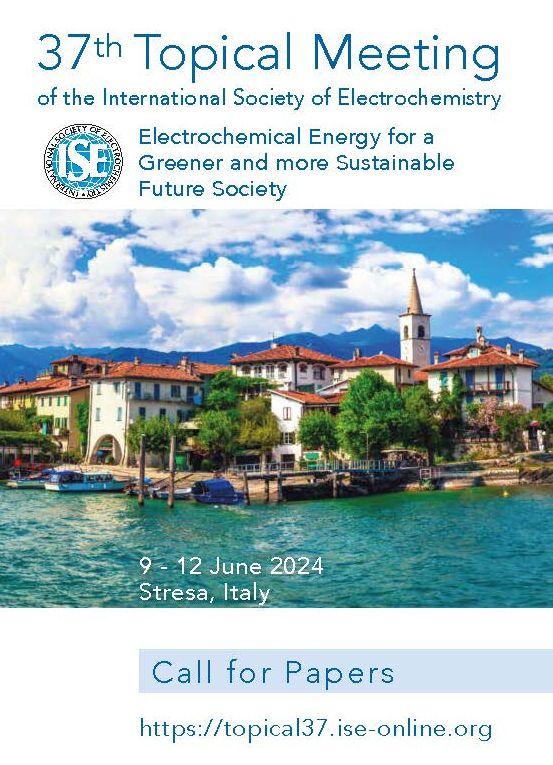Scientific Program
Conference Schedule (Draft)

The sustainable production and management of energy is the only alternative for human society to guarantee both technological progress for the entire population and the preservation of the Earth’s resources for future generations. This challenge requires the integration of different technologies, in which electrochemistry plays a fundamental role because it allows the use of chemical or electrochemical energy vectors with the highest efficiency, as opposed to mechanical, thermal or gravitational systems.
The scientific programme will consist of various symposia covering the entire value chain of the technologies, from fundamental materials research to applied research and advanced modelling and characterisation techniques (in situ, in operando, etc.), from the development of laboratory-scale devices and their technological applications to the discussion of integrated systems at higher TRL, The sustainable formulation of innovative electrodes and safe, non-toxic, probably solid-state, electrolytes and components will be encouraged, with attention to their potential recycling/reuse, in order to reduce the impact of electrochemical technologies, also in terms of critical raw materials, and to reduce their carbon footprint. The themes reflect the increasing importance of electrochemistry in the advancement of modern society, as well as its fundamental and valuable contribution to human and natural resources in a circular economy perspective to achieve sustainable development goals for future global decarbonisation.
List of keynotes/invited speakers (confirmed)
Symposium 1 - Lithium based technologies: Fundamental understanding and application aspects
novelties and advances in all key components of Li-ion batteries are considered, from lab-scale to industrial-scale devices, as well as approaches to improve the overall battery efficiency, capacity, and lifespan, with specific focus on in-situ/operando advanced techniques, advanced electrochemical characterization and computational modelling of materials/devices. The positive and negative electrode materials, electrolytes, components, and the physical implementation of Li-based batteries are discussed. In addition, current research on novel high energy density, solid-state Li-metal batteries is covered, as well as opportunities to repurpose and recycle the batteries.
Symposium Organizers:
Catia ARBIZZANI, University of Bologna
Francesco NOBILI, University of Camerino
Giovanni Battista APPETECCHI, ENEA Research Center “Casaccia“ Rome
Julia AMICI, Polytechnic University of Torino
Keynote Speaker:
Yi Cui (Stanford University)
Invited Speakers:
Dominic Bresser (KIT-HIU)
Patrik Johansson (Chalmers University of Technology)
Mauro Pasta (University of Oxford)
Magdalena Titirici (Imperial College, London)
Claire Villevieille (LEPMI - Grenoble INP)
Yong Yang (Xiamen University)
Symposium 2 - Beyond Lithium: new chemistries and approaches
latest developments in alternative battery systems based on chemistries other than lithium are here considered, from fundamental principles to materials design and optimization, electrochemistry, advanced characterization, modelling thereof and related devices, including supercapacitors and air/flow batteries. All different emerging applications calling for higher capacity, increased safety and lower costs while maintaining sufficient cyclability are considered, facing remaining challenges that often lead to poor cyclability, from lab-scale to commercial cell level.
Symposium Organizers:
Sergio BRUTTI, University of Rome “La Sapienza”
Francesca SOAVI, University of Bologna
Michele PAVONE, University of Napoli “Federico II”
Maria Assunta NAVARRA, University of Rome “La Sapienza”
Keynote Speaker:
Maria Rosa Palacín (ICMAB-CSIC)
Invited Speakers:
Ivana Hasa (WMG, University of Warwick)
Shinichi Komaba (Tokyo University of Science)
Nagore Ortiz Vitoriano (CIC EnergiGUNE)
Rebeca Marcilla (IMDEA Energia)
Jusef Hassoun (University of Ferrara)
Lorenzo Stievano (University of Montpellier)
Symposium 3 - Hydrogen Production Technologies: novelties and advances
novelties and advances in all materials and fundamentals electrochemistry related to water electrolyzers. Water electrolyzers (WEs) of interest include (but are not limited to) proton exchange membrane water electrolyzers (PEM-WEs), alkaline water electrolyzers (A-WEs), anion exchange membrane water electrolyzers (AEM-WEs), solid oxide electrolyzer cells (SOECs). The materials will include HER and OER electrocatalysts, membranes and ionomers, porous transport layers, bipolar plates. Their integration into catalysts layers, membrane electrodes assembly and single cells will be considered. These advancements will span from lab scale to prototypes including stacks. Opportunities to repurpose and recycle the components within WEs will be also discussed. Emphasis will be put on fundamentals of electrochemistry related to interfaces, spectro-electrochemical measurements, in-situ, and operando characterization.
Symposium Organizers:
Andrea BARICCI, Polytechnic University of Milano
Irene VASSALINI, University of Brescia
Vincenzo BAGLIO, CNR-ITAE Messina
Alessandra D’EPIFANIO, University of Rome “Tor Vergata”
Keynote Speaker:
Radenka Maric (UCONN)
Invited Speakers:
Svitlana Pylypenko (Colorado School of Mines)
Michael Eikerling (Forschungszentrum Juelich)
Dario Dekel (Technion - Israel Institute of Technology)
Aliaksandr Boundarenka (TUM)
Evelina Slavcheva (Bulgarian Academy of Science)
Antonino Salvatore Aricò (CNR-ITAE)
Symposium 4 - Hydrogen Conversion Technologies: fundamentals, materials, applications
latest developments related to fuel cells from fundamentals, to materials, to applications. Proton exchange membrane fuel cells (PEM-FCs), anion exchange membrane fuel cells (AEM-FCs), solid oxide fuel cells (SOFCs), etc. The reaction of interest will be HOR and ORR. Electrocatalysts, membranes and ionomers, porous transport layers, bipolar plates and their integration into catalysts layers, membrane electrodes assembly and single cells will be discussed. Advancements will span from lab scale experiments to prototypes including stacks. Recycling of critical raw materials and components within fuel cells will be treated. Emphasis will be put on fundamentals of electrochemistry related to interfaces, spectro-electrochemical measurements, in-situ, and operando characterization.
Symposium Organizers:
Christian DURANTE, University of Padova
Patrizia BOCCHETTA, University of Salento
Massimo INNOCENTI, University of Florence
Antonio BARBUCCI, University of Genova
Keynote Speaker:
Marian Chatenet (Univ. Grenoble)
Invited Speakers:
Lior Elbaz (Bar Ilan University)
Iryna Zenyuk (UC Irvine)
Ulrike Krewer (KIT-IAM)
Elena Savinova (CNRS Strasbourg)
Ulrike Kramm (TU Darmstadt)
Andrea Casalegno (Politecnico di Milano)
